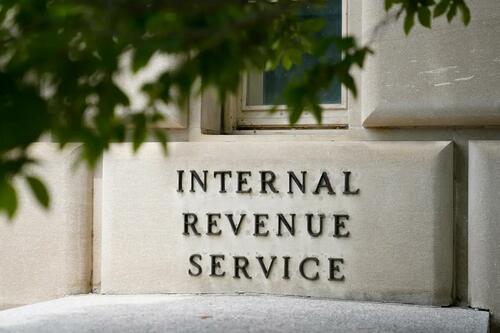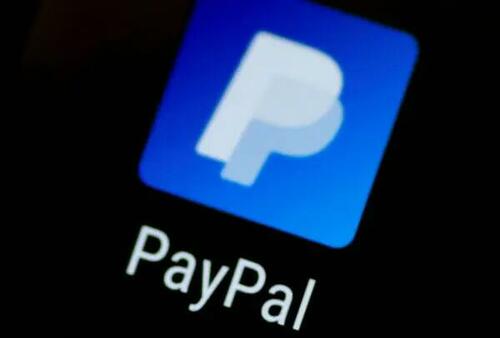“New Years’ Nightmare”: IRS Targets Gig Workers, Sends 30 Million New Tax Forms
Authored by Naveen Athrappully via The Epoch Times (emphasis ours),
A new IRS tax on gig workers would result in additional documentation that will create confusion among individual taxpayers as the agency does not have “centralized leadership” to deal with the expansion, according to a watchdog.
Starting this year, a new IRS rule required that third-party payment networks like PayPal, Venmo, Amazon, and Square issue Form 1099-K when a user receives more than $600 in gross sales from goods and services transactions in a single year. Earlier, the threshold of gross sales was over $20,000.
As a result, many taxpayers who never received Form 1099-Ks in the past will receive them this year, according to a Nov. 15 report by the U.S. Government Accountability Office (GAO). This could “exacerbate confusion among some taxpayers, such as gig workers, who may not understand the taxability of their payments and taxes owed.”
“For example, some of these taxpayers may not know how to calculate profit or loss and may not understand the information reported on the form. This puts them at risk of inaccurately reporting their incomes to IRS or not meeting their tax obligations.”
The IRS calculated that the new rule would result in 44 million Form 1099-Ks being filed in 2024, which is an increase of roughly 30 million. The tax agency “does not have a plan” to analyze these data to support its enforcement and outreach activities. “This limits its understanding of changes in taxpayer burden,” GAO said.
GAO also pointed to challenges facing the IRS with regard to its handling of “information returns.”
Information returns are filed by third parties like employers, businesses, banks and include Form W-2 for employee wages and Form 1099-K filed by payment networks. IRS compliance programs use these information returns to identify potential fraud and noncompliance among taxpayers.
However, “IRS lacks centralized leadership to make strategic decisions related to the use of information returns across the agency,” the GAO report stated.
“For example, IRS has not analyzed information returns comprehensively to determine if the returns’ characteristics (e.g., deadlines) meet IRS’s needs. While information returns support multiple IRS compliance programs, no office is responsible for coordinating these efforts.”
Burdensome for Americans
Commenting on the GAO report, the House Ways and Means Committee criticized Democrats for burdening everyday Americans with the new tax rule.
“Thanks to Democrats, more Americans who mow lawns or sell concert tickets and used couches through Venmo or PayPal will have those transactions scrutinized by the IRS starting in January 2024 thanks to a lower reporting threshold for IRS form 1099-K,” said a Nov. 16 press release from the committee.
The GAO report “shows that the IRS will send at least 30 million new 1099-K tax forms to Americans’ mailboxes come January, even though the agency has no plan on what to do with the new information—and it is unlikely most Americans will understand how to fill them out.”
Committee Chairman Jason Smith (R-Mo.) called the additional tax forms “a new years’ nightmare for millions of Americans and a mess for the IRS.”
The 1099-K form applies to people who are engaged in activities like gig work and casual sales who make side or extra income via selling their services or goods. 1099-K is an “information return” form submitted by third parties like PayPal. Individual taxpayers can use these returns to complete their tax filings. The IRS uses 1099-K to verify income and taxes reported by taxpayers.
The policy to reduce the gross sales threshold from $20,000 to just $600 was included in the American Rescue Plan Act of 2021. The rule was initially supposed to come into effect during tax year 2022. However, the IRS postponed it to the 2023 tax year.
“The Biden Administration itself had to deploy a legally dubious delay of this policy for a year precisely because it is unworkable. The whole plan is just another effort by Washington Democrats to use the IRS to target working families,” Mr. Smith said.
“According to the Joint Committee on Taxation, over 90 percent of this new tax burden will fall on middle-class families and gig workers who will be caught in the crosshairs of the Democrats’ tax scheme.”
In the report, GAO recommended that the IRS develop a plan to systematically evaluate information returns to improve compliance and minimize fraud and reporting burden.
It also asked the tax agency to determine the “most appropriate thresholds for payment information reporting” like Form 1099-K.
The report “shows the IRS is ill-equipped to handle the implementation of this new policy while at the same time it does not even know if it will help the agency carry out its responsibilities,” Mr. Smith said.
“Like with so much of the Democrats’ tax policies, this is a solution in search of a problem—one that will confuse Americans and put them in danger of inaccurately assessing their own tax liabilities.”
Taxing Americans’ Side Incomes
The Coalition for 1099-K Fairness, whose members include the likes of PayPal, Airbnb, Etsy, and eBay, said that millions of Americans and micro-businesses will receive 1099-Ks “often in instances where there is no tax liability whatsoever, causing fear, confusion, frustration, and overreporting of taxable income.”
A February 2022 survey by the coalition found that most casual sellers are only conducting small amounts worth of sales transactions online. It pointed out that 86 percent of them made less than $5,000 in gross revenues from items sold online in 2021.
For 89 percent of survey respondents, selling was not their primary source of income. And 47 percent of people were unaware of the new IRS reporting requirements.
People who engage in such side income activities have to provide personal information, including Social Security number or employer identification number (EIN) to the third-party app through which they conduct transactions.
Once the transactions hit the $600 threshold limit, the third party will send a 1099-K to the individual. In case the person did not provide their personal information and the transaction hit the $600 limit, the third party will withhold 24 percent of the payments collected via the app.
This amount will be sent to the IRS and will not be returned to the individual. However, the amount can be reported on the person’s tax returns.
Tyler Durden
Mon, 11/20/2023 – 19:40
via ZeroHedge News https://ift.tt/tqWobTE Tyler Durden

